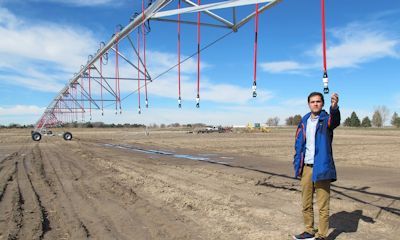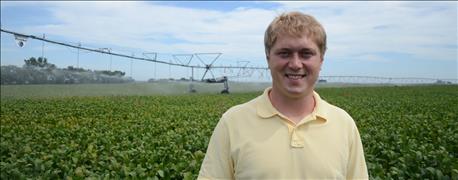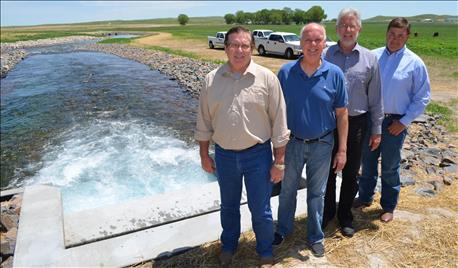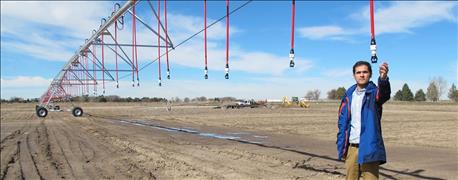
In recent years, drought has brought to light just how vital of a resource water is – and just how quickly things can go south once that resource dries up. Nebraska, for the most part, is in no short supply of water – about 70% of the Ogallala Aquifer falls within the state's boundaries. However, there is a big precipitation gradient and a range of soil types across the state. For those who are allocated in water-limited areas, there's a strong push to irrigate more efficiently. Likewise, in some places where groundwater levels aren't a concern, over-irrigating has caused problems with nitrate leaching.

ELIMINATING EXPENSIVE SURPRISES: Clark McPheeters, 28, has used an Internet-connected Reinke base station since 2012 to monitor and control pivots via his computer and smartphone. With the drought, it was a good year to install pivot telemetry. When pivots went down, he knew in six minutes.
But Nebraskans, whether irrigator, Natural Resources District, or Extension or University researcher, are good at adapting. There are a number of ways through various programs, management practices, and technologies that Nebraskans are cutting back on how much water is being used to irrigate their crops, and to make sure the water that is being used is used in the most efficient way possible.
We've compiled a list of some of our top stories over the last year to give you a look at just how Nebraskans are adapting and making more efficient use of water:
Farmers, NRDs, technology preserve groundwater resources: Water used for irrigating crops dropped by 30% across a wide swath of Nebraska in 2014. From the spring of 2014 to the spring of 2015, groundwater levels began to rise, following significant declines resulting from the extended period of drought from early 2012 through summer 2013.

RUNNING WATER: Jack Russell, manager, Middle Republican NRD (left); Mike Clements, manager, Lower Republican NRD; Kent Miller, manager, Twin Platte NRD; and Jasper Fanning, manager, Upper Republican NRD (right) stand in the discharge area of the NCORPE project where water flows into Medicine Creek, a tributary of the Republican River. Photo courtesy of Upper Republican NRD.
Precision ag tech is ushering in a new era for young irrigators: Whether it's using soil moisture sensors, rain gauges, atmometers, or using telemetry to monitor and control pivots, young tech-savvy irrigators are getting their feet wet with precision irrigation technology.
Augmentation projects keep Nebraska in compliance with Compact: Innovative stream flow augmentation projects along the Republic River Basin have prevented major irrigation well shutdown in south central and southwest Nebraska. However, there are detractors for two Republican River augmentation projects including the Rock Creek augmentation project in Dundy County and the Nebraska Cooperative Republican Platte Enhancement project in Lincoln County.
Expanding water markets: In late March 2016, the Central Platte Natural Resources District's (CPNRD) board of directors approved the first transactions for a new Groundwater Exchange Program – the first of its kind in Nebraska. The process uses a computer program that matches up buyers and sellers each year for an annual exchange.

NEW VRI SYSTEM: Irrigation water management specialist Amir Haghverdi inspects one of the nozzles on the new, precision, variable-rate linear irrigation system.
A growing interest in variable-rate irrigation: Variable rate irrigation is drawing more attention in recent years as more companies have started offering VRI technology. Amir Haghverdi, Nebraska Extension irrigation water management specialist researched VRI as part of his PhD research at the University of Tennessee, and is continuing his research on VRI with a lateral move VRI system at the Panhandle Research and Extension Center at Scottsbluff.
Irrigation is crossing new frontiers: While Nebraska remains the number 1 irrigated state, over the last 30 to 40 years there has been an expansion of irrigated acres in regions like the Mississippi Delta and other parts of the southeast and eastern U.S. These regions receive ample amounts of rainfall, so why do they need irrigation? In addition to drought years like 2012, it comes down to ensuring the crop has enough water at the right time.
About the Author(s)
You May Also Like






